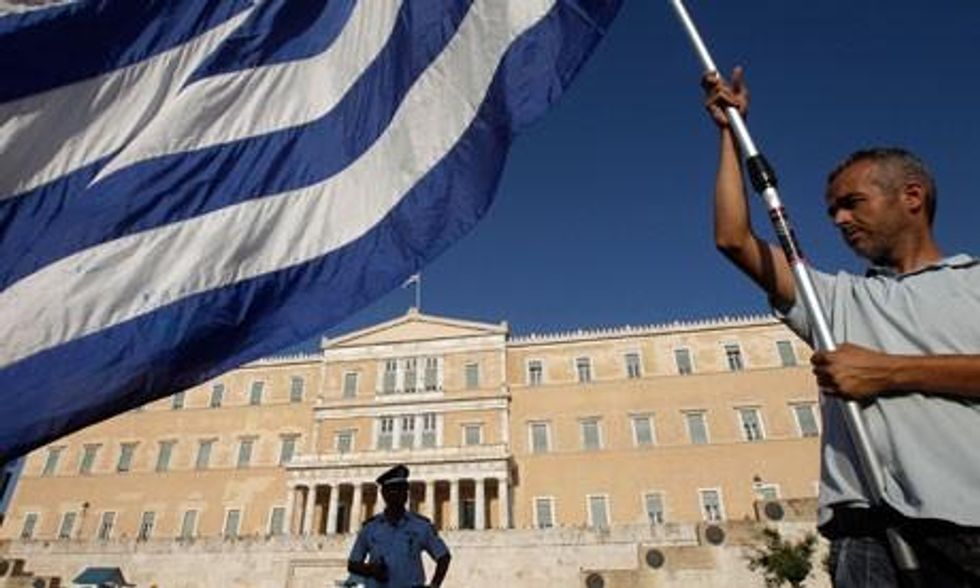Greece is facing an economic and social disaster, the result of its so-called rescue by the "troika" of the EU, the International Monetary Fund and the European Central Bank. Greece must change course to avoid a grim future for its people: it must default on its debt and exit the eurozone.
Consider first the scale of the crisis. After contracting in 2009 and 2010, GDP fell by a further 7.3% in the second quarter of 2011. Unemployment is approaching 900,000 and is projected to exceed 1.2 million, in a population of 11 million. These are figures reminiscent of the Great Depression of the 1930s.
The causes clearly lie with the programme of the troika. In early 2010 Greece was effectively bankrupt. In its wisdom, the troika imposed policies of severe austerity and deregulation consistent with the neoliberal ideology of the EU. Quite predictably, demand collapsed and banking credit became scarce, with the result that the core of the Greek economy was crushed.
The social implications have been catastrophic. Entire communities have been devastated by unemployment, losing the means to live as well as the norms, customs and respect of regular work. Barter has appeared among the poor and the not so poor. Medical services in working-class areas are running low on basic provisions. Schools and transport are disintegrating. People are abandoning cities to return to agriculture, a sure sign of social retrogression.
As the recession deepened, the programme failed to meet even its own targets. The budget deficit for 2011 is on course for 10% of GDP, when the target was slightly above 7%. The debt-to-GDP ratio could reach 200% in 2013, up from 115% in 2009. But the troika has refused to acknowledge failure and in early September blackmailed Greece: take further austerity measures or there will be no more lending. The government has buckled, introducing the equivalent of a heavy poll tax on property. A further meeting with the troika was scheduled for today, following which there would be mass layoffs of civil servants, further wage and pension cuts, still higher indirect taxes, and so on.
These measures are also likely to fail: they will intensify the recession and be opposed politically. George Papandreou's government is isolated, and the ruling party has lost any ability to generate grassroots support. The official opposition, New Democracy, has been critical of troika policies, hoping to make electoral gains. The parties of the left have already called for open defiance and non-payment.
In practice Greece is on the brink of defaulting and abandoning the euro. This is the harsh reality, though none of the major parties is prepared to acknowledge it. The tragedy is that Greece now has a far weaker economy than in 2010. It is likely, therefore, that there will be major economic and social upheaval with unpredictable outcomes.
With the best interests of its people in mind, what should a government do? The first step would be to default, but without entrusting the process to bankers, the EU and the IMF, for we have evidence of what that would mean. Last July Greece agreed on an exchange of old for new debt that would reduce its debt to banks by 21%. Yet it also had to provide massive collateral guarantees to banks, with the result that its total debt might actually increase. Even so, many banks have not accepted this incredibly favourable deal, hoping instead for full repayment.
If default is to secure a deep cancellation of debt, it must be driven by Greece and it should be coercive as far as the banks are concerned. But it must also be democratic, based on an independent auditing of debt to ascertain how much might be illegitimate. Greece is not without advantages in this regard. Most public bonds are subject to domestic law that means terms of repayment can be altered through an act of parliament. Moreover, the "rescue" loans by the EU and the IMF may be declared illegitimate by an independent audit. The Greek people could thus regain a modicum of self-respect, savagely destroyed during the last couple of years.
The second step would be to exit the eurozone, but in a manner that would be in the long-term interests of working people, not big business or banks. Contrary to what is often asserted, Greece would not collapse if it quit the euro. After all, monetary unions have a limited shelf life, and Europe's is a particularly badly structured one. Exit is the most sensible way for Greece to restore competitiveness and start to recover. The alternative is to continue with austerity packages that do not work and will lead to long term decline.
A progressive government would take several decisive steps: switch to a new drachma quickly; nationalise the banks; and impose capital controls. There would need to be administrative measures to ensure supplies of oil, food and medicine, along with income and wealth redistribution to support the poorest. Recovery should start in a few months, spurred by devaluation that would allow industry to increase exports and recapture the domestic market. If progressive forces showed sufficient will, it would then be possible to transform the economy deeply, changing the balance of power in favour of working people.
Default and exit would cause international turmoil. Greek debt may not be large enough directly to threaten European banks, but world banking is in a fragile state. Greek action would disturb the secondary markets for sovereign bonds, potentially leading to a major crisis. But the EU authorities would have only themselves to blame, since their policies are in effect driving Greece out of the eurozone.




